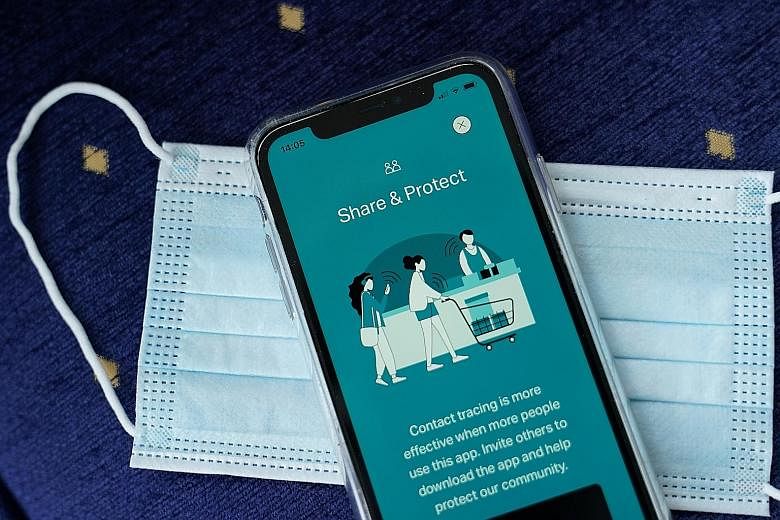DUBLIN • Europe's experiment in using technology to fight the coronavirus has achieved some early success: Millions of people have downloaded smartphone tracker apps and hundreds have uploaded the results of positive Covid-19 tests.
Yet, most European countries so far lack solid evidence that their apps - which identify close contacts via Bluetooth connections with nearby users - are actually alerting people who may have caught the disease before they can infect others.
The reason? Design choices made by governments and their app developers to protect people's privacy.
In many of the 11 European territories using architecture designed by Alphabet's Google and Apple, apps have been made to be "blind" to warnings of potential exposure to Covid-19 flowing through the system.
In Switzerland, for example, the Federal Office of Public Health acknowledged that "the effectiveness of the SwissCovid App is difficult to measure because of the 'privacy by design'".
The weakness puzzles some who have championed the apps. They point out that the Apple-Google framework does allow for some data collection, while at the same time making it impossible for governments to stalk their own citizens.
Dr Michael Veale, a lecturer at University College London, said: "I find it quite strange that many of the systems are designed not to be able to monitor and evaluate."
Ireland, which uses the same standard, is showing the benefits of being a bit less privacy-obsessed. Its Covid Tracker app, which has been downloaded by 30 per cent of the population, tallies how many people upload a positive test result and how many get notifications.
Mr Colme Harte, technical director at software development firm NearForm, which created the app, said: "We're seeing the whole end-to-end flow and success from that perspective."
A total of 58 users registered positive tests in the app's first three weeks of operation through to July 28, generating 137 close-contact alerts. Of these, 129 opted to get a follow-up call from Ireland's contact tracing team.
Elsewhere in Europe, the data is much sketchier.
In reply to a Reuters inquiry, Germany's federal agency for disease control, the Robert Koch Institute, said: "It is impossible to say how many people have received risk notifications."
This is because checking for alerts is handled on individual devices, an approach called decentralisation.
Germany's Corona Warn App has been downloaded more than 16 million times, though uptake has slowed since it emerged that some smartphones were sending the app to sleep to save battery.
The problem was soon fixed but prompted critical media coverage.
So far, 1,052 people who have tested positive have been issued with one-time codes to upload into the system, according to weekly figures from the Robert Koch Institute. But there is no way of knowing if they actually did so.
Other European countries, meanwhile, are turning to surveys as a workaround.
In Denmark, the Statens Serum Institute for infectious diseases last week published a survey which found that 48 people had booked a Covid-19 test online after getting risk warnings from the Smittestop app.
"The app should work as a digital supplement to our efforts in infection tracking," Health Minister Magnus Heunicke said. "It's good news that we now also have figures showing that the app works and helps to find unknown contacts."
REUTERS












